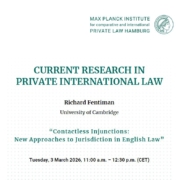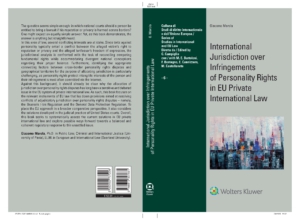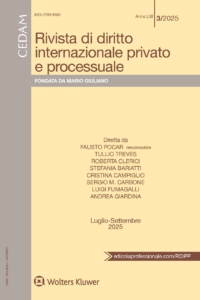 From 18 to 20 June 2026 the European Association of Private International Law (EAPIL) will host its third biannual conference. Following the Association’s conferences in Aarhus (Denmark) and Wroclaw (Poland) the conference promises to be a key event for scholars and practitioners interested in the present and future of European private international law.
From 18 to 20 June 2026 the European Association of Private International Law (EAPIL) will host its third biannual conference. Following the Association’s conferences in Aarhus (Denmark) and Wroclaw (Poland) the conference promises to be a key event for scholars and practitioners interested in the present and future of European private international law.
Programme and Audience
Under the title “Shaping the Future of Private International Law in Europe – Putting Together the Pieces & Filling Gaps”, the conference will address structural developments, unresolved issues, and emerging challenges in European private international law. Special emphasis will be placed on 1) the consolidation of European private international law in a single instrument (EuPIL Act), 2) the unification of international property law (including the protection of cultural objects), and 3) the relationship of European Private International Law with third States.
All topics will be addressed from an analytical and a forward-looking perspective, combining doctrinal reflection with policy-oriented debate. Contributions will come from an internationally diverse group of speakers, reflecting EAPIL’s commitment to comparative and transnational perspectives.
The conference is open to academics, judges, practitioners, policymakers, and early-career researchers with an interest in (European) private international law.
Venue and Organisation
Hosted by the Faculty of Law of the University of Geneva, the conference will take place exclusively in person in Geneva. The choice of venue underscores the international outlook of the event and provides an ideal setting for scholarly exchange and networking.
Registration
Registration is available here. An early-bird rate applies until 15 March 2026, with standard registration available until 17 May 2026. Participation fees vary depending on registration date and include the option to attend the conference dinner. Further details on fees and registration can be found on the conference website.
Why Attend?
The EAPIL Conference 2026 offers a unique opportunity to:
- engage with cutting-edge research in private international law,
- discuss current reform projects and unresolved doctrinal questions,
- connect with leading scholars and practitioners from across jurisdictions, and
- contribute to shaping the future development of the field.
Further Information
More information on the programme, registration, and practical details is available on the conference website.
About EAPIL
The European Association of Private International Law was founded in 2019 to promote the study and development of Private International Law. It has today more than 600 members from more than 70 countries. For more information visit the EAPIL website and follow the EAPIL blog.


 From 18 to 20 June 2026 the
From 18 to 20 June 2026 the 


